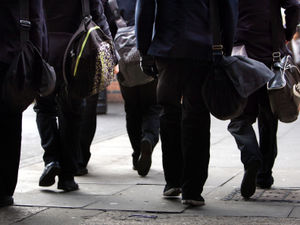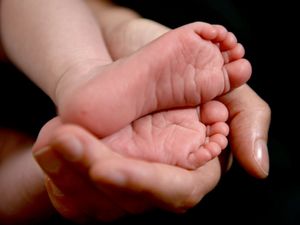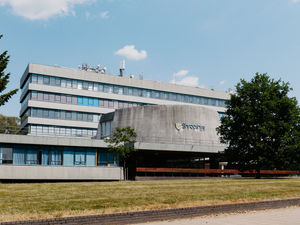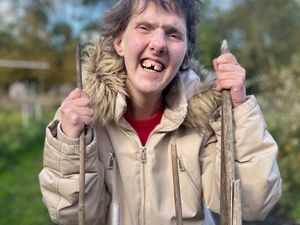How Shrewsbury Christian Aid is helping Nicaragua
[gallery] This Sunday sees the start of Christian Aid Week and this year the charity is highlighting its work helping poor coffee farmers in Nicaragua. Andrew Owen went to see how its money - including thousands of pounds raised in Shropshire - is making a difference.
This Sunday sees the start of Christian Aid Week and this year the charity is highlighting its work helping poor coffee farmers in Nicaragua. Andrew Owen went to see how its money - including thousands of pounds raised in Shropshire - is making a difference.
Deep within the coffee plantations of Nicaragua, along a bumpy, winding dirt and gravel road that leads past open fields, up and down steep hills and past the tiny, isolated shacks that people out here call home, there is the village of La Paz.
It's a tiny, remote place, a world away from the life you know in England. It has a school, but it's not a school you would recognise, and I doubt very much that you would want your children to come here.
It's made of breeze blocks and wood, with a corrugated metal roof. It has no electricity, and the only light in the classroom comes through the windows, which contain no glass.
Outside, next to the covered porch, there's a muddy ditch that runs around to the back of the building. There's no water, and there are no toilets. You can imagine how the ditch smells.
Still, even a building that was once used to store fertilisers and chemicals — the fertilisers and chemicals needed to grow the coffee that provides a livelihood for many of the 800 villagers — is better than nothing. Before the old store was given its new use, children were taught in villagers' homes.
And these homes are not much to look at either: simple wooden shacks often lashed together with rope and topped with corrugated steel or tarpaulin. They have dirt floors, "rooms" made by hanging material from a piece of string, hammocks instead of beds, clay ovens, and buckets for collecting water from the river - the river where people wash themselves and their clothes and fetch water for drinking and cooking.
In a land of poverty - and after years of dictatorship, civil war and natural disasters Nicaragua is the second poorest country in central America — La Paz is a very poor place indeed.
"We really don't know how lucky we are," says Jo Pattison, of Shrewsbury's Christian Aid group, when I spoke to her several weeks after returning home. "There are so many things we take for granted. We're incredibly rich, even if we don't think we are.
"I think it's totally unfair for people who are producing something for me to enjoy, like a mug of coffee, to not have enough to live on, for their children not to have an education, and health care. I just think that's wrong. How can I enjoy it if people are being ripped off?"
Shrewsbury's branch of Christian Aid holds regular events throughout the year to raise money, including soup lunches, quizzes, and bag packing at Christmas. But the big focus is Christian Aid Week, when volunteers go from house to house to collect donations.
Last year members raised more than £24,000 during Christian Aid Week, and that money is helping the charity to improve lives around the world.
"The money goes to people of all faiths and none, which is important to say. It's not just for Christians, but for where the need is greatest," added Mrs Pattison.
In Nicaragua the need is very great indeed, and Christian Aid is working with a partner organisation called the Society for Small producers, Exporters, Marketers and Buyers of Coffee - a collective known as Soppexcca.
Soppexcca provides loans so farmers can buy land, equipment and seeds.
It offers technical expertise to help those farmers produce higher quality coffee, works to raise labour standards for the thousands of people employed in factories processing coffee - many of whom earn less than two dollars a day — and through its Fairtrade status buys the coffee at a guaranteed price. This cuts out the middlemen and gives farmers a higher income.
Over the past 14 years Christian Aid's work with Soppexcca has grown to encompass 650 coffee farmers in 18 communities, bringing benefits to 9,000 people.
Soppexcca has been working with the village of La Paz for four years, and although only 40 producers have joined (there is some mistrust here after a previous attempt at a collective failed), they have high hopes that more will get involved and everyone will benefit. A new school building is high on the "to do" list.
And things are improving, mother of three Beatrice Castro testifies. Her home is small and very basic, and its walls are made of planks — you can see outside through the gaps. But it's hers; she bought it with the money she saved during 10 years of working as a labourer for coffee producers.
Mrs Castro, whose husband works as a lorry driver, now produces her own coffee and sells it through the collective.
She even owns a radio — a luxury out here — and it's truly bizarre to be in a tiny village miles from anywhere, with the sound of Abba in the background.
"I do feel a sense of pride," says Mrs Castro. "And I don't have to go far for work because my land is here."
Villagers in La Paz hope working with Soppexcca will help them to emulate the relative prosperity enjoyed in the hill village of Los Alpes, which has been a member of Soppexcca for more than a decade.
It takes about an hour to get to Los Alpes from Jinotega, the capital of this coffee-producing region.
Jinotega is on a main road, which is made from tarmac and well-maintained. It's a pleasure to drive on. The road to Los Alpes is made of gravel and potholes and mud, the legacy of the rainy season and floods.
We're here to meet Gustavo Talavera, an organic coffee producer and one of the founders of the local co-operative.
Sitting in a hammock in his yard, Mr Talavera seems happy with his life and the improvements the collective has made over the past decade, including the equipment needed to partially process the coffee.
Certainly, his grandchildren will have a better life than he had. Mr Talavera, who is 55, started working at the age of six just for food. He never went to school - "there were no schools" - and although he received some education as an adult, he is illiterate.
"There's no government help with schooling for our kids," he tells us. "But thanks to Soppexcca we have a school."
He takes us there on foot, and at the school we see the children, some of whom walk for over an hour to get to lessons. It's still a poor place — there are no computers, carpets or electricity — but they have more books and better equipment than the children in La Paz and most wear Soppexcca-sponsored uniforms. Considering where we are, their white shirts are spotless.
Here, in one room, they are taught to read and write, and the maths they will need to ensure they know they are getting the right price for their coffee or their labour. It's a start, and, hopefully, one that will help them to have better lives.
Back in Shrewsbury, Jo Pattison sums up the aims of Christian Aid week and the work the charity is doing.
"People are all the same, no matter where they're living" she says. "They have the same desires and want the same things, it's just that they're living in different circumstances. We sometimes think of them as being different, but all they want for their kids is what we want for ours."






